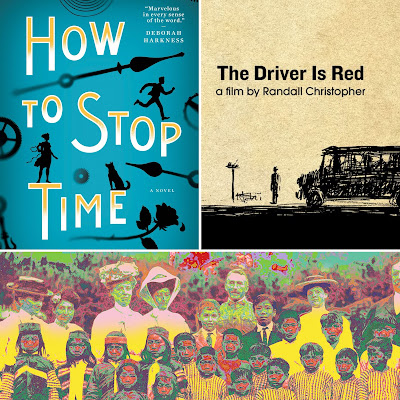ROUND-UP March 1-March 16, 2018
Hello dear readers! This time I've got an interview with Randall Christopher, who directed the animated short film The Driver is Red, which tells the story of the capture of Adolf Eichmann, in the The New Hampshire Jewish Reporter, as well as a book review for PopMatters. Also present: a review of a show at Vox Populi for Artblog, a local Philly site!
- "An Interview With the Director of The Driver Is Red." The New Hampshire Jewish Reporter, March 2018, pp. 12-14.
"Q: I was looking at the artist statement for The Driver Is Red that you have on your site. Obviously and unfortunately, the subject matter is all too relevant for our time right now. You’re an animator, so what made you think, 'I can tell this story with animation?'
"A: That’s what I do. That’s my trade; I don’t make films. I got really interested in the story after reading a New York Times article two years ago that was about historical curiosities Israel had released, including handwritten letters of Eichmann -- the handwritten appeal letter. And I was wondering, 'What was this guy’s story?' I didn’t grow up knowing much about any of that. The Holocaust wasn’t in my school. It’s really awful."
- "'How to Stop Time' Is Thoughtful but Thin." PopMatters, March 5, 2018.
"The prose is strong and occasionally excellent, and there are some lovely quirks that allow the reader to experience, in some part, the strangeness of existing through centuries of change and development. In Tom's retelling, a window in a room in the 16th century is the same size as the portable television Tom used in Brazil in 1980: it's a neat rhetorical trick that allows us to enjoy the brief anachronism of something in the past being compared to something that doesn't yet exist, because of how it's slotted into Tom's memory."
- "Layers of narrative in Maria Dumlao’s 'History in RGB' at Vox Populi Gallery." Artblog, March 16, 2018.
"The feeling upon entering History in RGB is that of walking into some kind of glitch; the violently-bright color posters hanging on the walls combine with the arrangement of plants in the center, faintly simmering under red, green, and blue lights, to invoke a state of heightened anxiety. Aside from ocular discomfort, there are several kinds of intellectual tension at play in this work — the struggle between history and myth-making, the struggle over the role of photography as a truth-telling medium, and, as it turns out, a struggle between the viewer of History in RGB and the work itself."

Comments
Post a Comment